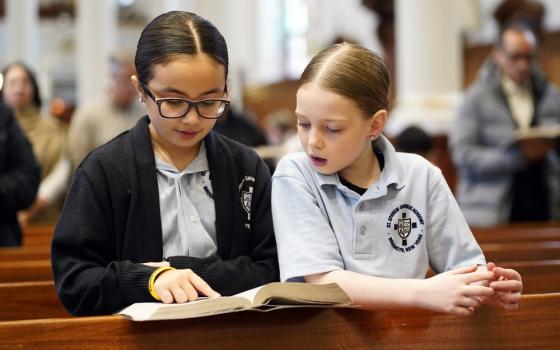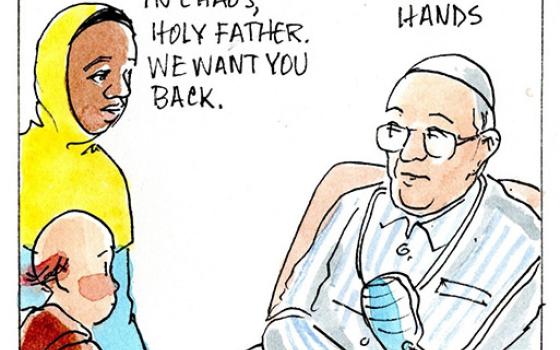Perhaps the most important words from today’s gospel are what Jesus says at the end of the lesson, after he tells the parable.
He says that one person went down to his house justified, not the other. If we understand the full implications of what it means to be justified, we perhaps will have a deeper understanding of what Jesus means by this parable.
|
If one is justified, it means that you are in a right relationship -- first of all with God, then with other people, and even with all of creation itself. Being justified in the sight of God is to be one very close to God.
As we listen to the lessons today, I think we find the way that each one of us, as we leave this church this morning, can go back to our regular daily life justified in the sight of God -- justified in a right relationship with God, with others, and even with creation itself.
The first lesson teaches us something about God, the God who will justify us as we celebrate today. Our God is a God, first of all, who looks with love on the poor, the God who hears the prayer of the oppressed, the God who does not disdain the plea of the widow nor the plight of the orphan.
What Sirach is telling us in that first lesson is that our God is a God, beyond even our understanding, of profound compassion and love that reaches out, first of all, to those who are most vulnerable -- and in the time of the scriptures: the poor, the widow, the orphan. These are the ones who need God’s love most of all.
And our God is a God who -- as we sang after that first lesson -- reaches out to the poor, loves the poor, has compassion for the poor. So this lesson helps us to understand the God who wants to be in relationship with us and wants our relationship with God to be one of deep love -- a relationship where we try to know God as God really is.
Those words of Sirach -- if we just think for a moment about how Jesus reveals God for us in the Gospels, we can understand how our God really is this kind of a God because what did Jesus do whenever there was someone in need?
Jesus is always quick to reach out, to help, to heal.
You think of the people who were with him for many days and were hungry after those days in the desert place. The disciples wanted to send them away but Jesus says, “No, we must take care of them now.” Jesus reaches out to the poor.
Or you think of Jesus as the one who when the lepers came to him (in the gospel a few Sundays ago), immediately when they asked, “Have mercy on us,” Jesus sent them to the priest to be judged whether they had the leprosy or not -- and on the way, all of them are healed.
Jesus reaches out quickly with love and compassion. That’s how God is -- so this helps us, first of all, to understand who God is and then how now we relate to God.
The gospel lesson is very helpful.
First of all, we must not totally misjudge that Pharisee. We can learn something from his prayer because he recognizes how blessed he is. He cites what he’s been able to do with God’s help: “I fast, even beyond what the Law asks. I give tithes, not just a tenth of my agricultural products, but of all my resources.”
So the Pharisee is a good person, trying to live according to the teachings of the scriptures. However, there is one problem with that Pharisee, even though he is praying in a way that is totally acceptable.
When you look at what Paul says in his words to Timothy: “As for me, the time of sacrifice has arrived, the moment of my departure has come,” and Paul goes on to say, “I have fought the good fight, I have finished the race, I have kept the faith.” So it’s perfectly good for us to recognize, and it’s something we should do, the goodness that’s in us, the goodness that we have.
And so often, I think, we tend to want to put ourselves down instead of thinking of how “I am blessed because I am able to relate to God through faith. I too, like Paul, try to run the race and win that race, keep the faith.”
The difference between Paul and the Pharisee is also very clear.
The Pharisee tends to think it’s his own doing, whereas Paul recognizes “It is God who has been working through me and in me that enables me to have completed my life now, faithful to God,” and to the call that God gave to him.
 The Friends of NCR 2011 Annual Appeal is underway. Please support us so that we may continue to provide the best independent Catholic news through informed reporting, analysis and commentary. The Friends of NCR 2011 Annual Appeal is underway. Please support us so that we may continue to provide the best independent Catholic news through informed reporting, analysis and commentary. |
So each one of us too, can stand before God and must stand before God, giving thanks and praise to God for what God does within us and through us as we try to imitate the way of Jesus.
As we listen then to the scriptures of today, we can stand before God and praise God and thank God and we can try to imitate the way of Jesus -- that way of love, the way of compassion, reaching out to the poor and the marginalized and the oppressed.
And if we do that, then surely Jesus will say about each one of us that we return to our home justified -- we live in right relationship with God, with others, and with creation itself.
As we celebrate the Eucharist, we must turn to God in that prayer of praise and thanksgiving, but also recognizing that it is God who does this good work within us -- and then we will leave this church hearing God say to us, “You are returning to your home, to your daily life, justified.”
[Bishop Gumbleton preached this homily at St. Hilary Church in Redford, Mich.]



